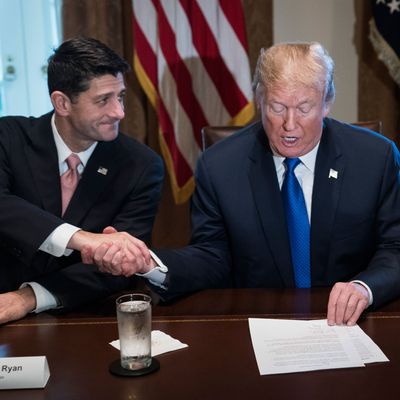
As he has silently endured, or cooperated with, an endless series of Trumpian outrages, House Speaker Paul Ryan has been mocked as a spineless party functionary. But Ryan is not lacking in spine. He flashed a display of steel this week when he canceled a fundraiser with New York representative Lee Zeldin, whose offense was to criticize the House tax cut bill for provisions harming Zeldin’s constituents.
To the outside world, it might seem bizarre that Ryan would tolerate the slow transformation of his party into authoritarianism and naked racism, only to rise up in righteous indignation over a defection on a tax bill that nonetheless passed easily. Ryan is a man of principle, and his principles are shared by many if not most members of his party’s elite. Their fixation with cutting taxes and their tolerance for the president’s abuses of power are both expressions of these principles. We need to understand these beliefs and what they imply.
In addition to their belief in the curative powers of supply-side economics, and their desire to reward their donor base, conservatives consider redistribution a monstrous moral evil. Tax cuts represent a victory in a cause far larger than squeezing out a couple tenths of a percent of economic growth or another private jet for their rich friends. This belief pops up when wealthy conservatives compare progressive taxation to the Nazi persecution of the Jews — a belief they share, despite the inevitable backlash, with surprising frequency. In 2002, Senator Phil Gramm called a policy to tax capital gains by people who renounce U.S. citizenship something “right out of Nazi Germany.” In 2003, Grover Norquist described the estate tax as “the morality of the Holocaust. ‘Well, it’s only a small percentage,’ you know. ‘I mean, it’s not you, it’s somebody else.’… arguing that it’s OK to loot some group because it’s them, or kill some group because it’s them and because it’s a small number, that has no place in a democratic society that treats people equally.” In 2010, Stephen Schwarzman described a proposal to raise taxes on private equity firms as “like when Hitler invaded Poland in 1939.” In 2014, Ken Langone remarked on plans to raise taxes on the rich, “If you go back to 1933, with different words, this is what Hitler was saying in Germany.” That same year, Tom Perkins said, “The parallels of fascist Nazi Germany to its war on its ‘one percent,’ namely its Jews, to the progressive war on the American one percent, namely the “rich.””
What are they telling us with these comments? They are revealing that there is something more than dollars and sense at stake. They believe a political system that allows the majority to vote themselves a raise by taxing a minority is a form of persecution.
Economic libertarianism is the quality that most sharply distinguishes the modern Republican Party from conservative parties in other democracies. Economic libertarians consider the free market to be the sole fair arbiter of the distribution of wealth. If I have earned 100 times the average wage through acts of capitalism between consenting adults, the theory goes, then I am entitled to keep it. For hard-core economic libertarians, this absolute right to property supersedes all other rights.
The Niskanen Center’s Will Wilkinson, who could be called either a recovering libertarian or a moderate libertarian attempting to recover the philosophy’s defensible elements while jettisoning the rest, wrote a remarkable essay not long ago. In it, Wilkinson confessed the anti-democratic tendencies built into the most powerful strands of American economic libertarian thought. It is not only Ayn Rand who disdained democracy as “a social system in which one’s work, one’s property, one’s mind, and one’s life are at the mercy of any gang that may muster the vote of a majority at any moment for any purpose.” Other libertarians, like Frederick Hayek, Robert Nozick, and others, advocated similar views. (Paul Ryan, the Republican Party’s chief ideologist, has been deeply influenced by all these thinkers.)
During the 20th century, “fusionism” brought economic libertarianism together with hawkish foreign policy and social traditionalism as the standard American conservative dogma. Wilkinson argues that economic libertarianism has contributed to the Republican Party’s contempt for democratic norms. “The traces of libertarianism that survive in contemporary fusionism,” he writes, “have left many conservatives with a Jacobin’s indifference to the norms and institutions of successful liberal-democratic polities, and an unpopular vision of prosperity as freedom from redistribution.”
It’s not a coincidence that, while some hawkish conservative intellectuals have recoiled from Trump, he has retained the loyalty of the party’s money wing. The Wall Street Journal editorial page spins wild fantasies to justify firing Robert Mueller; Rand Paul, the most libertarian Republican in Congress, has forged a tight bond with the president; Wall Street has thrilled to his policies.
Liberals have had trouble grasping the willingness of conventional Republican politicians like Ryan to cooperate with Trump’s repeated violations of democratic norms. Why violate a core ideal like the sanctity of the republican form of government, they wonder, for a meager reward like tax cuts?
From the standpoint of a Paul Ryan, however, he is not selling out. He is advancing his highest ideals of public service. The tax bill, protecting the makers from the predations of the takers, represents one of the great triumphs of freedom of his adult life.






























